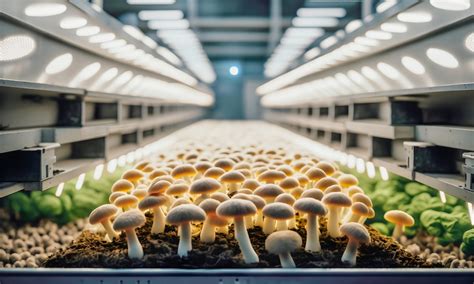The fascinating world of mushrooms has been gaining significant attention in recent years, and for good reason. These humble organisms have been found to possess a wide range of unique properties that make them an ideal candidate for revolutionizing various industries. From sustainable materials and pharmaceuticals to food production and environmental remediation, the potential applications of mushroom technology are vast and exciting.
What is Mushroom Technology?
Mushroom technology, also known as mycotechnology, refers to the use of mushrooms and their byproducts to develop innovative solutions for various industries. This field of research has been gaining momentum in recent years, driven by the growing recognition of the unique properties of mushrooms. From their remarkable ability to break down organic matter to their potential to produce sustainable materials, mushrooms are being explored for their potential to transform industries.

Applications of Mushroom Technology
The applications of mushroom technology are diverse and far-reaching. Some of the most promising areas of research include:
- Sustainable materials: Mushrooms can be used to produce sustainable materials such as bioplastics, textiles, and building materials.
- Pharmaceuticals: Mushrooms have been found to possess a wide range of bioactive compounds with potential medicinal applications.
- Food production: Mushrooms can be used as a sustainable source of protein and other essential nutrients.
- Environmental remediation: Mushrooms have been found to have a remarkable ability to break down organic pollutants and heavy metals.
Sustainable Materials
One of the most exciting applications of mushroom technology is the production of sustainable materials. Mycelium, the vegetative part of the mushroom, can be used to produce a wide range of materials, including bioplastics, textiles, and building materials. These materials have several advantages over traditional materials, including reduced environmental impact, improved durability, and increased sustainability.

Pharmaceutical Applications
Mushrooms have been found to possess a wide range of bioactive compounds with potential medicinal applications. These compounds have been found to have anti-inflammatory, antimicrobial, and antioxidant properties, making them useful for the treatment of various diseases.
- Cancer treatment: Some mushrooms have been found to have anti-tumor properties, making them useful for the treatment of cancer.
- Immune system support: Mushrooms have been found to have immunomodulatory effects, making them useful for supporting the immune system.
- Antimicrobial applications: Mushrooms have been found to have antimicrobial properties, making them useful for the treatment of infections.
Food Production
Mushrooms are a sustainable source of protein and other essential nutrients. They can be used as a food source in various forms, including whole mushrooms, mushroom-based products, and mushroom-based feed for animals.

Environmental Remediation
Mushrooms have been found to have a remarkable ability to break down organic pollutants and heavy metals. This property makes them useful for environmental remediation applications.
- Soil remediation: Mushrooms can be used to clean up contaminated soil by breaking down pollutants and heavy metals.
- Water remediation: Mushrooms can be used to clean up contaminated water by breaking down pollutants and heavy metals.
- Air remediation: Mushrooms can be used to clean up contaminated air by breaking down pollutants and heavy metals.
Gallery of Mushroom Technology






FAQs
What is mushroom technology?
+Mushroom technology, also known as mycotechnology, refers to the use of mushrooms and their byproducts to develop innovative solutions for various industries.
What are the applications of mushroom technology?
+The applications of mushroom technology include sustainable materials, pharmaceuticals, food production, and environmental remediation.
What are the benefits of using mushroom technology?
+The benefits of using mushroom technology include reduced environmental impact, improved durability, and increased sustainability.
In conclusion, mushroom technology is a rapidly growing field that has the potential to revolutionize various industries. From sustainable materials and pharmaceuticals to food production and environmental remediation, the applications of mushroom technology are vast and exciting. As research continues to uncover the unique properties of mushrooms, we can expect to see even more innovative solutions emerge.
